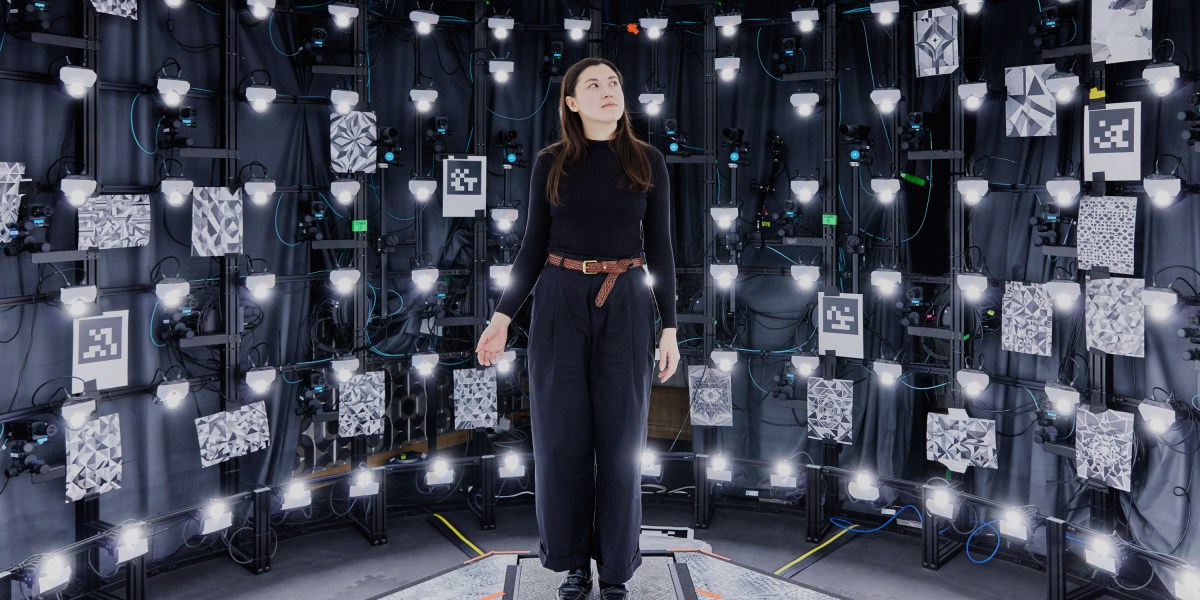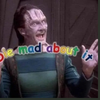Thanks to rapid advancements in generative AI and a glut of training data created by human actors that has been fed into its AI model, Synthesia has been able to produce avatars that are indeed more humanlike and more expressive than their predecessors. The digital clones are better able to match their reactions and intonation to the sentiment of their scripts—acting more upbeat when talking about happy things, for instance, and more serious or sad when talking about unpleasant things. They also do a better job matching facial expressions—the tiny movements that can speak for us without words.
But this technological progress also signals a much larger social and cultural shift. Increasingly, so much of what we see on our screens is generated (or at least tinkered with) by AI, and it is becoming more and more difficult to distinguish what is real from what is not. This threatens our trust in everything we see, which could have very real, very dangerous consequences.
“I think we might just have to say goodbye to finding out about the truth in a quick way,” says Sandra Wachter, a professor at the Oxford Internet Institute, who researches the legal and ethical implications of AI. “The idea that you can just quickly Google something and know what’s fact and what’s fiction—I don’t think it works like that anymore.”
It’s noble how many of you are willing to get philosophical about the rise of deep fakes freeing us from puritan beliefs and readdressing the concept of truth.
While completely fucking ignoring the harassment and extortion of deep fakes. Y’all want to get high minded about YOUR right to free speach using OTHER peoples bodies as a gateway to some utopia, while playing dumb that this is just another form of mysgonstic abuse. If it truly is just you something you are doing in the privacy of your own home, why the fuck do you need other people’s media?
Your ideals are built upon YET AGAIN women taking one for the team. The “truth” is immposible to know so YOLO, let’s turn any women who made the mistake of being photographed in to porn. Her consent doesn’t matter between the privacy of me and my dataset, even if I do upload it and blackmail her a lil’.
.
A reminder for anyone reading this that you are in a universe that behaves at cosmic scales like it is continuous with singularities and whatnot, and behaves even at small scales like it is continuous, but as soon as it is interacted with switches to behaving like it is discrete.
If the persistent information about those interactions is erased, it goes back to behaving continuous.
If our universe really was continuous even at the smallest scales, it couldn’t be a simulated one if free will exists, as it would take an infinite amount of information to track how you would interact with it and change it.
But by switching to discrete units when interacted with, it means state changes are finite, even if they seem unthinkably complex and detailed to us.
We use a very similar paradigm in massive open worlds like No Man’s Sky where an algorithm procedurally generates a universe with billions of planets that can each be visited, but then converts those to discrete voxels to track how you interact with and change things.
So you are currently reading an article about how the emerging tech being built is creating increasingly realistic digital copies of humans in virtual spaces, while thinking of yourself as being a human inside a universe that behaves in a way that would not be able to be simulated if interacted with but then spontaneously changes to a way that can be simulated when interacted with.
I really think people are going to need to prepare for serious adjustments to the ways in which they understand their place in the universe which are going to become increasingly hard to ignore as the next few years go by and tech trends like this continue.
Your comment reads like rambling, unless you’re so much smarter than anybody else. I couldn’t make out many cohesive thoughts, merely guessing here.
First of, our universe doesn’t change the moment we touch something, else any interaction would create a parallel universe, which in itself is fiction and unobservable.
Then you talk about removing persistent information. Why would you do that and how would you do that? What is the point of even wanting or trying to do that? An AI robot talking and moving isn’t that different than when we had non AI, case based reasoning. Even the most random noise AI can produce is based of something. It’s a sum of values. We didn’t and don’t generate a computerized random number any differnt.
You can’t proof that our universe is or isn’t simulated, simplified the simulation would only need to stimulate your life in your head, not more. Actually what your eyes see and what your brain is receiving, is already a form of simulation, as it is not exact.
No Man’s Sky is using generic if else switch cases to generate randomness. Else you’d get donut planets for instance or a cat as planet, but you never will in infinite generations. Just because there’s mathematical randomness by adding noise, doesn’t make it change much about its constraints. Even current AI is deterministic, but the effort to prove that isn’t realistically approachable. I personality believe even a human brain would be provable deterministic, if you could look into the finest details and reproduce it. But we can’t reverse time, so that’s going to be impossible.
However we can only observe our own current universe. So how would AI change that now? Also our universe is changing even when you yourself interact with nothing.
It would help if your were more precise in what you’re implying. What change of anyone’s perspective? Doesn’t seam to be any different to the past, unless you mean tech illiterate, like people would react on seeing a video/photo of themselves for the first time. It’s not like AI can read your mind and interact with things the same way you would, nor even predict or do the same as you.
AI is just guessing and that’s often good enough, but it can be totally wrong (for now) by doing deterministically things with only one solution. It can summarize text but will fail by simple math calculations, because it’s not calculating but guessing by probability, in its realm of constraints.
First of, our universe doesn’t change the moment we touch something, else any interaction would create a parallel universe, which in itself is fiction and unobservable.
https://en.m.wikipedia.org/wiki/Double-slit_experiment
Then you talk about removing persistent information. Why would you do that and how would you do that? What is the point of even wanting or trying to do that?
https://en.m.wikipedia.org/wiki/Quantum_eraser_experiment
No Man’s Sky is using generic if else switch cases to generate randomness.
If/else statements can’t generate randomness. They can alter behavior based on random input, but they cannot generate randomness in and of themselves.
Even current AI is deterministic
No, it’s stochastic.
I don’t understand all that you’re saying, but it seems you’re basing your argument off the incorrect assumption that free will exists.
Ah, Lemmy…
“I don’t understand what you’re talking about, but you’re wrong.”
Lol, I see how you could see it that way. I meant rather that I thought I did understand the part where you claimed free will existed, but not the argument based off that.
While Superderminism is a valid solution to both Bell’s paradox and this result, it isn’t a factor in the Frauchiger-Renner paradox so there must be something else going on at very least in addition to it (which then complies less with Occam’s razor).
And it would be pretty superfluous for our universe to behave the way it does around interactions and measurements if free will didn’t exist.
incorrect assumption that free will exists.
Actually free will does exist, unless you define it by some ridiculous standard that I want to fly but I can’t.
You have free will to pursue your survival and best interests, obviously within the limitations of our physical body.The way this is possible within a physical construct that must obey physical laws, is that consciousness exist within a virtual reality constructed within that physical construct by our brains. And is thus not directly tied to the physical realm, but instead indirectly. Which makes room for things like learning, memory, consciousness and free will.
It’s actually the people who try to reconcile free will and a deterministic universe who make the ridiculous arguments, such as compatibilism, which basically just redefines free will. If free will were to be true, you have to have the ability to have acted differently.
It’s actually the people who try to reconcile free will and a deterministic universe
The universe is not deterministic, but that’s completely irrelevant. The argument of free will does not rely on the lack of determinism of quantum mechanics. That was a philosophical argument once, but it doesn’t actually change anything.
If free will were to be true, you have to have the ability to have acted differently.
And how will you determine the existence or lack thereof, of the ability to act differently?
I’d say we very probably have this ability, since we often reacts differently in similar situations. Ergo by your own standard, your conclusion is wrong.You have to have acted differently at that time in that situation, not at another time in a different situation.
That’s an impossible standard, you can’t act “differently” when you have already acted. That would mean you should be able to make two actions at the same time, It doesn’t make the tiniest bit of sense, and even if we could, it wouldn’t either prove or disprove free will.
But you do have free will to choose your actions, only limited by your physique and kognitive ability. There’s a reason everybody has that feeling, and that is it is true.The idea that we do NOT have free will, is pure speculation based on arguments from ignorance. It boils down to: “I don’t understand how free will is possible given the physical reality as we understand it”. But just because you don’t understand it, doesn’t mean others don’t either.
The reason that it’s possible seems to me to be that our mind that exist in out brain, is a virtual representation of reality, which means there is an abstraction layer between consciousness and the physical brain.
This is the reason we can understand abstractions at all, which in itself proves that our minds can exceed what is possible in physical reality.
We can think of a waterfall going up, despite that is impossible in reality. We can imagine reverse causality/entropy despite it’s improbable.
This is only possible because we have a consciousness with free will that allow us those things, way beyond what is physical reality.And how will you determine the existence or lack thereof, of the ability to act differently?
You didn’t answer that. Probably because that’s impossible.
I had anticipated that there would be an uptick in cryptographic signing to combat the problem as this sort of fakery has become ubiquitous, which in my mind would assure the recipient of a file that
A) the file is unaltered after the date/time of the signing B) that the file was created by the named photographer or videographer
This is not proof of authenticity but with a verifiable source, the file recipient could at least judge for themselves based on the reputation of the file creator (say, a notable AP photojournalist vs. some random schmoe).
Thus far, whenever I have raised this idea in a public forum, it has met with silence or even derision. What am I missing?
It takes an extra 2 minutes, that’s why its dead in the water. People go who would spend x amount of time to deepfake me that I should spend an extra two minutes on assuring integrity? And well for most of the population they are probably right.
I suppose you are correct, but it seems like a standard could be adopted to automate the process for both the creator and the consumer. And while the system would work for any creator, it seems most important to be able to ensure the integrity of the work product of journalistic professionals.
NFTs to the rescue - what a joke.
You seem to be conflating NFTs and digital signatures. Any file can be signed, unrelated to any sort of block chain technology. See PGP and related for more information.
Edit: fixed a typo
Why should I trust the authenticity of your signning key? Solution 1: web of trust like PGP. Impossible with foreign content. Solution 2: Trusted Certificate authorities (private/ state/ UN) Solution 3: a block chain (scaling problems)
If I generate a key pair and use it to sign a file and distribute it and then I publish the public key somewhere like Facebook, any recipient of the file could be assured that the file originated from my Facebook account. A commercial certificate is not required to do this. As to whether the Facebook account holder is actually me is another problem, but hopefully major social media platforms require at least a photo ID.
Edit: Sorry, I said public certificate when I meant commercial certificate.
Literally nothing to do with nfts
I thought for a second I was in boring dystopia
But you are, IRL
I for one vote everyone just be done with public internet media and stick to outside, known person to known person interaction, and info from reputable news sources that vet their sources and maintain a high standard of accuracy.
This is the best summary I could come up with:
“I think we might just have to say goodbye to finding out about the truth in a quick way,” says Sandra Wachter, a professor at the Oxford Internet Institute, who researches the legal and ethical implications of AI.
We’re about to take on a topic that’s pretty delicate and honestly hits close to home—dealing with criticism in our spiritual journey,” I read off the teleprompter, simultaneously trying to visualize ranting about something to my partner during the complain-y version.
Historically, making AI avatars look natural and matching mouth movements to speech has been a very difficult challenge, says David Barber, a professor of machine learning at University College London who is not involved in Synthesia’s work.
And while anyone can join the platform, many features aren’t available until people go through an extensive vetting system similar to that used by the banking industry, which includes talking to the sales team, signing legal contracts, and submitting to security auditing, says Voica.
Claire Leibowicz, the head of the AI and media integrity at the nonprofit Partnership on AI, says she worries that growing awareness of this gap will make it easier to “plausibly deny and cast doubt on real material or media as evidence in many different contexts, not only in the news, [but] also in the courts, in the financial services industry, and in many of our institutions.” She tells me she’s heartened by the resources Synthesia has devoted to content moderation and consent but says that process is never flawless.
It really shines when presenting a story I wrote about how the field of robotics could be getting its own ChatGPT moment; the virtual AI assistant summarizes the long read into a decent short video, which my avatar narrates.
The original article contains 4,026 words, the summary contains 289 words. Saved 93%. I’m a bot and I’m open source!
It looks like the screen is smeard in vasoline. To be fair, you have to be primed to notice or halucinate it. Did the AI decide the movements too, because that woman looks possesed, her eyes behave correctly but she moves her jaw wildly at the beginning of every sentence. she even twitches at one point.
So AI is exactly what the Internet was for…
Removed by mod
Stonetoss is a Nazi. Please don’t give him exposure.
deleted by creator











